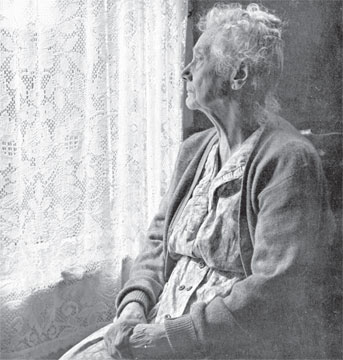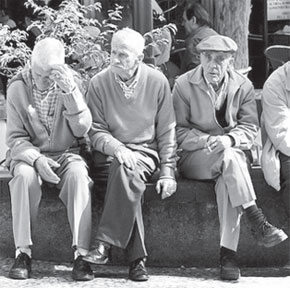|
Ageing gracefully:
Caring for elders with dignity
By Lionel WIJESIRI
 According to reliable statistics, more than 22 percent of our
population will be over 60 in about two decades. Of the rest of the
population, there will be 61 dependents for each 100 adults. According
to another survey, Sri Lanka has been rated as the country with the
fastest growing ageing population in South East Asia. According to reliable statistics, more than 22 percent of our
population will be over 60 in about two decades. Of the rest of the
population, there will be 61 dependents for each 100 adults. According
to another survey, Sri Lanka has been rated as the country with the
fastest growing ageing population in South East Asia.
What do these revelations mean? It means that we should be ready with
a comprehensive action plan to protect the rights of the elderly
population within the next decade to avoid all possibilities of any
ageing crisis.
The real challenges of caring for the elderly in 2020s will involve:
(1) making sure society develops health systems for long-term care that
work better than existing ones, (2) taking advantage of advances in
behavioural health to keep the elderly as healthy and active as
possible, (3) changing the way society organises community services so
that care is more accessible, and (4) altering the cultural view of
ageing to make sure all ages are integrated into the fabric of community
life.
Preparation
To meet the long-term care needs of today’s 50+ generation, social
and public policy changes must begin soon. Meeting the financial and
social service burdens of growing numbers of elders will not be a
daunting task if changes are made now rather than when that generation
actually need long-term care.
Public policy goals related to an ageing society must balance the
need to provide adequate services and transfers with an interest in
maintaining the economic and social well-being of the non-elderly. The
economic challenges should be such that public and private progress that
begins in the near future will make the future burden substantially
easier to handle.
Healthy ageing
 Perhaps the most important challenge related to ageing populations is
the challenge of healthy ageing. Healthy ageing (or successful or
productive ageing) is the concept of keeping seniors disability-free and
thus avoiding some of the need for long-term care. Keeping seniors
healthy and functioning could have significant economic impacts. In
addition to reducing long-term care costs, healthier elderly are more
likely to be productive members of society. Perhaps the most important challenge related to ageing populations is
the challenge of healthy ageing. Healthy ageing (or successful or
productive ageing) is the concept of keeping seniors disability-free and
thus avoiding some of the need for long-term care. Keeping seniors
healthy and functioning could have significant economic impacts. In
addition to reducing long-term care costs, healthier elderly are more
likely to be productive members of society.
In contrast to the scarce attention being paid to improving financing
for long-term care, the healthy ageing challenge has generated
significant interest.
Better management by the medical care system of a broad range of
chronic diseases could also reduce the incidence of disability.
Society’s understanding of what the health system needs to do to
encourage prevention and clinical care management of chronic diseases
has improved tremendously in recent years. Despite this, the right
formula has not emerged for setting incentives that will lead to
widespread adoption of good clinical care management principles among
the numerous medical providers, including the children, who care for the
elders.
Cultural change
The other important challenge related to meeting the long-term care
needs of an ageing population is quite intangible and is dependent on
culture rather than public policy. The idea
of elders as an economic burden or as frail and weak is a
twentieth-century construct. An interesting book by Thomas Cole traces
the history of society’s views on ageing.
In ages when death struck randomly and evenly at all ages, people did
not focus so much on a birth to death, linear view of life. And,
agrarian economies, like Sri Lanka, where the young, the middle-aged,
and the old all play productive roles enhanced the sense of the value of
all ages.
So, in past eras life was viewed more as a circle - the Lion King
image. But, since the colonial domination from 19th century and
especially during the twentieth century, as more people have lived to
old age, the linear interpretation of the life cycle has become
dominant.
The past century’s improvements in medical and economic conditions
for older people have been accompanied by cultural isolation and a
change in the conception of old age. Old age has been removed from its
once spiritual location in the journey of life to being redefined as a
medical problem.
Perhaps it is time to rethink the value of ageing and the positive
aspects of ageing and to adopt a cultural view captured by the imagery
of the “Long Late Afternoon of Life.” While it is difficult to change
“culture” per se and the way elders are viewed in society, there are
practical steps communities, employers, and individuals can begin to
take to prepare for a society with greater numbers of healthy elders.
Assets
First, it is worth reassessing the responsibilities and assets of
elders. All ages need roles in life. According to Erik Erikson, the
hallmark of successful late-life development is the capacity to be
generative and to pass on to future generations what one has learned
from life.
Marc Freedman has called the elderly “a country’s number one growing
resource” and views the ageing of the population as an opportunity to be
seized. More than half of all elderly volunteer their time.
Companies are integrating workforces through programs of
“non-retirement” or by hiring retirees as temps, consultants, and
part-time workers. Surveys suggest that the 60-year trend of a
decreasing number of elderly working has reversed itself as Baby Boomers
reconsider their financial needs for retirement as well as how they want
to spend more than a third of their adult life.
The young elderly (people in their 60s) have reported increased
ability to work. Most forecasters project this trend to continue as more
elderly work longer for economic, social, and personal reasons,
employers become more flexible and aware of the needs and benefits of
older workers.
Since the sheer size and energy of the older generation has led to
other dramatic social shifts, some experts see hope that a new imagery
for ageing is possible. A growing interest in “age integration” - a
process that takes advantage of the broadened range of accumulated “life
course” experiences in society - has occurred over the past few decades.
In an age-integrated society, changes made to bring older people into
the mainstream could simultaneously enlarge personal opportunities and
relieve many other people who are in their middle years of the
work–family “crunch”.
Message
Cultural change also is possible, in terms of one-to-one
relationships. Older generation have made an art of enjoying and taking
pride in everything about caring for children; some even go so far as
managing to almost “enjoy” paying for specialising in preferred
subjects. The needed cultural shift is for children and communities to
find more enjoyment and pride in providing for the care of parents and
neighbours.
The simple message - and the intangible goal - is to recognise the
give and take of all parts of society. Anyone who has spent time caring
for an elderly friend or relative recognises that in the end, caregivers
receive far more than they give in the relationship. Everyone benefits
when the elderly can be integrated fully into a caring society.
Elders are precious. They deserve our best care. Keeping elders in
their homes means keeping them in the community where they can continue
to provide leadership and impart knowledge so their grandchildren can
one day become wise elders…keeping the circle intact.
|

